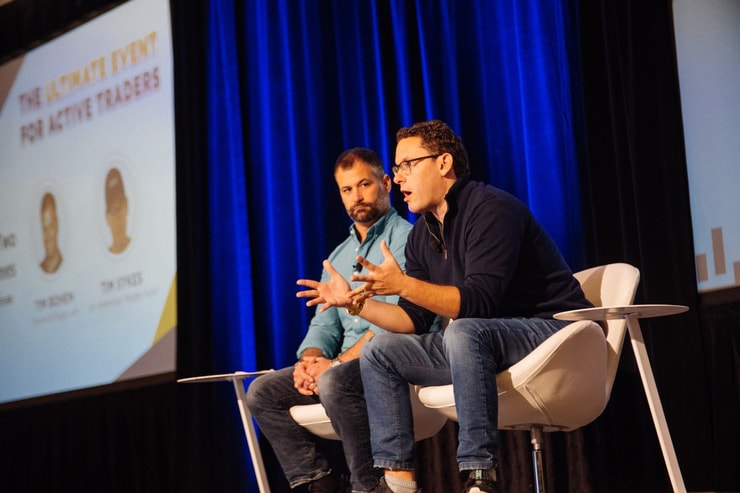When I started trading, my goal was simple: becoming a multi-millionaire—a feat I achieved in my early 20s.
Today, I aim to help my dedicated students achieve their financial goals.
More than 30 of them have gone on to become millionaire traders…
But I’ll be honest, the majority never taste that level of success.
Why?
I believe it concerns these five critical differences between elite traders and amateurs.
Table of Contents
#1 Mindset and Psychological Strength

Elite traders approach with a growth mindset. They understand that success doesn’t happen overnight. They embrace failures as learning opportunities and are constantly seeking improvement.
None of my millionaire students made large profits in their first year of trading. However, that never stopped them from studying, trying to learn, and get better each day.
On the other hand, the amateur is always looking for a shortcut or “hack.” They’re in a rush to get rich. They often get bogged down by losses, viewing them as personal failures.
I know many traders struggling right now, but you MUST hang in here & keep learning/adapting. I'm barely green this year, was barely green last year, but made $1+ million in both 2020 & 2021 so I'm averaging $600k/year over 4 years…some years are better than others #DayTrading
— Timothy Sykes (@timothysykes) October 18, 2023
#2 Commitment to Continuous Learning

I began trading in the late 90s… a lot has changed. When I first got in this game, I didn’t have to worry much about high-frequency traders, dark pools, and ECNs. On the bright side, access to information is more level, commissions are cheaper (and in some cases free), and regular folks have access to Wall Street-level trading tools.
As the markets have evolved…so has my trading.
I started primarily as a short seller…but today, I’m playing the other side and squeezing short sellers.
Elite traders acknowledge that the market is always evolving and so must their strategies.
They dedicate time to studying trends, adapting to market shifts, and refining their techniques.
The amateur tends to find one strategy, get a few wins, and become complacent, thinking they’ve “cracked the code.”
STUDY CHECK, WHO'S STILL UP STUDYING??? WHO WANTS SUCCESS BAD ENOUGH????
— Timothy Sykes (@timothysykes) October 22, 2023
More Breaking News
- Goodyear Faces Challenges with Earnings Miss Amid Industry Turbulence
- Jumia Faces Market Headwinds Amid Rising Costs and Strategic Challenges
- ABP’s Stock Movement Signals Market Concerns Amid Broader Trends
- MNTS Stock Surges Amid Strategic Expansion and Financial Insights
# 3 Risk Management

One of the main reasons why I’ve been able to outlast so many traders is because of my number one trading rule: Cut losses quickly.
For most of my trades I aim for a quick 5-10% profit. If that move doesn’t happen fast enough for me, I’ll bail. If I start to experience heat, I’ll cut my losses fast.
I’m a big believer of stacking small wins up.
You NEVER have to #HODL as groupthink was a BIG problem with promoters & it led to everyone getting wrecked in the https://t.co/QTYT7tQ5da mania & now lots of short selling/trading chatrooms use the same brainwashing techniques. Don't give into peer pressure, be self-sufficient!
— Timothy Sykes (@timothysykes) October 20, 2023
On the other hand, amateurs are trying to get rich from one trade. Moreover, they’re always thinking about how much they can make on a trade. They never have a plan in case they are wrong.
When you don’t prepare for a loss then you’ll likely let your emotions drive your decisions.
One of the reasons why we’ve so many short squeezes lately is because short sellers have lost control of their emotions.
They are so stubborn…they disregard risk management.
You never want to put yourself in a position where one stock can ruin your trading account. And always, have a plan.
#4 Discipline and Consistency

Social media has glamourized trading over the years.
But here’s one thing you won’t hear from anyone else.
Trading at a high level should be boring.
You see, it’s all about routines.
Every morning, I layout my watchlist. At the end of each day I review my trades. I’m constantly looking at what’s working and what isn’t. I’m trying make adjustments in order to have success on my next trade.
When I put a trading plan together, I stick to it.
Moreover, I know consistency is key in long-term success.
Amateurs are always looking for “hot plays” and picks. They don’t like reviewing their trades, and they have no interest in refining their strategies.
It's sometimes hard to distinguish good vs bad info, I remember how popular #atlastrading got during the mania, but they turned out to be frauds & worse their "teachings" bankrupted anyone who followed them. Misinformation & lack of education in the #StockMarket is EXPENSIVE AF!
— Timothy Sykes (@timothysykes) October 22, 2023
Their results are inconsistent because their actions are. If you want to succeed in this game then you must be disciplined and stay consistent.
#5 Community and Mentorship

I’m a big believer in trading for yourself and making independent decisions. I want all my students to be self-sufficient.
But I also understand the value of being part of a community. If you see other people in the community having success that will keep you motivated. Not to mention, learning from others, and gaining knowledge from traders who have achieved what you want to achieve.
Amateurs often try to go it alone. Or often find themselves in shady discord chat rooms seeking “hot plays.” They don’t get support, just toxic one-sided ideas.
Unlock The Elite Trader Within You! 📈

It’s been a wild ride since I embarked on my trading journey, transforming from a rookie to a multi-millionaire.
Yet, what sets apart a select few who make it big from those who falter?
Through my decades of experience, I’ve distilled it down to five critical differences.
From the vital importance of a growth mindset and continuous learning, to risk management and the power of community, these distinctions are game-changers.
And it’s not just about knowledge; it’s about applying it in real, volatile markets.
🚀 Are you making amateur mistakes or are you on the path to becoming an elite trader?
🚀 Want to understand what it really takes to thrive in this ever-evolving market?
🚀 Ready to immerse yourself in actionable strategies that can steer you clear of pitfalls and position you for success?
Then, you can’t afford to miss this:
Join me for an exclusive live training session where we’ll delve deeper into these distinctions, offering insights, and strategies.
🔥 Equip yourself with the techniques that have enabled me and my top students to stay profitable, even when the market defies logic.
🔥 Dive into real-time analysis, gaining clarity on the current market’s nuances and how to capitalize on them.
🔥 Embrace the discipline, consistency, and community spirit that’s the hallmark of elite traders.
It’s not just about trading. It’s about mastering it.
Ready to elevate your trading game and walk the path of the elite? Your roadmap to trading mastery awaits. Don’t be left behind!



Leave a reply